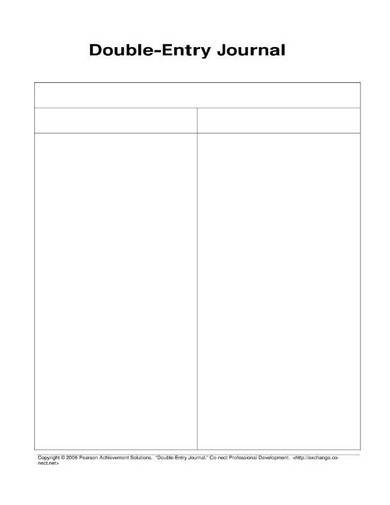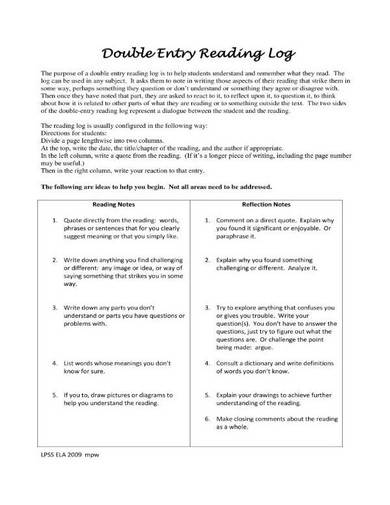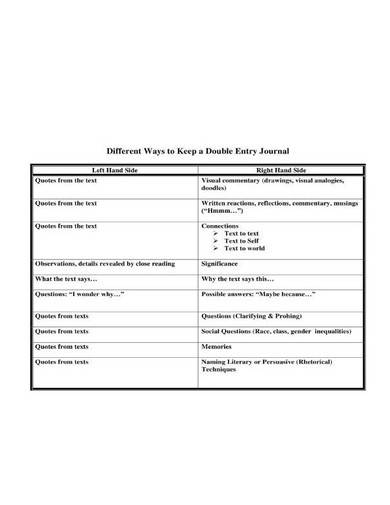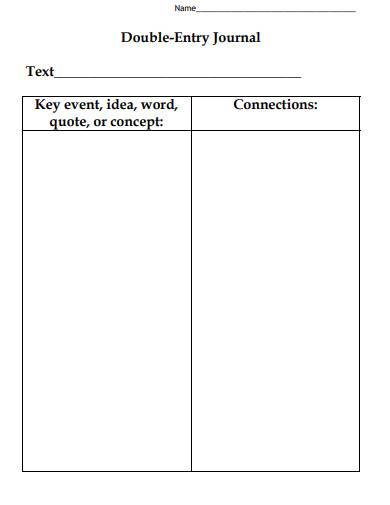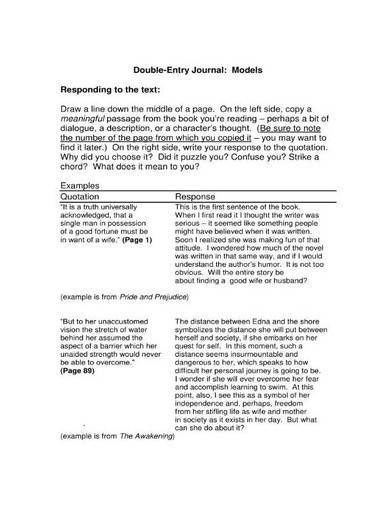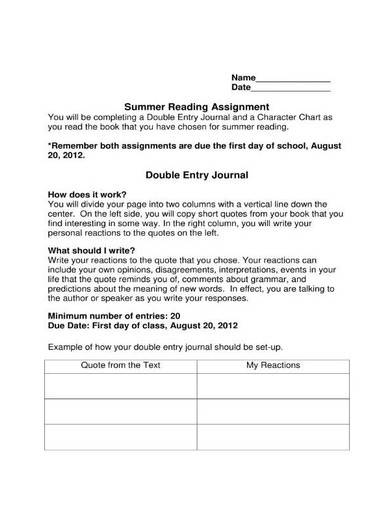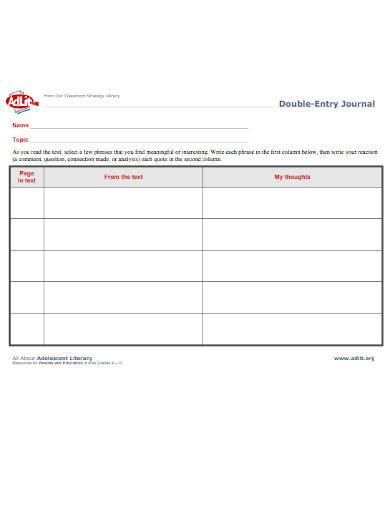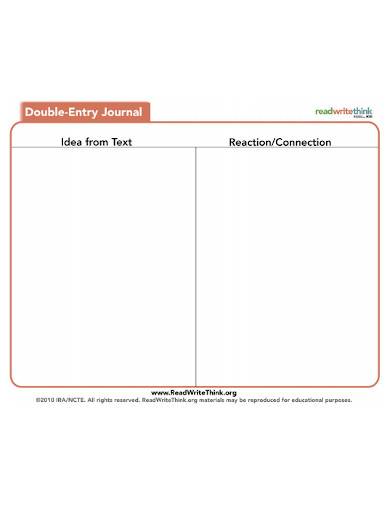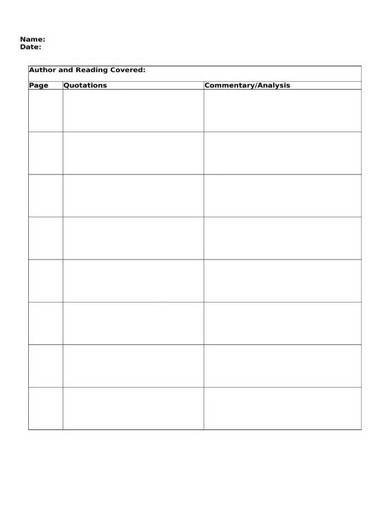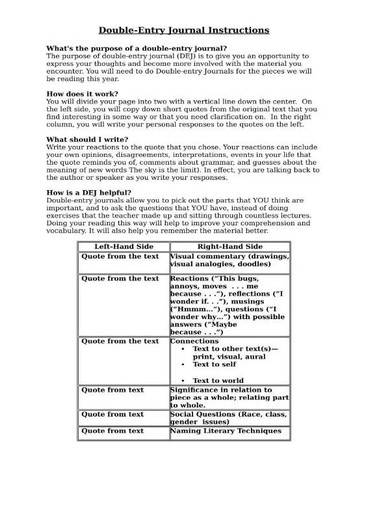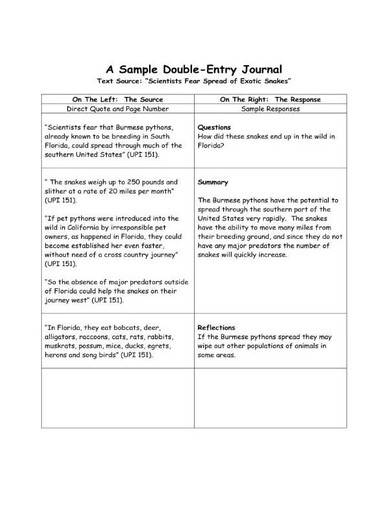Teachers or professors utilize different learning materials to ensure that their students are learning from their classes or lessons. They also use lesson planners to effectively organize and manage the lessons they will be teaching. Other templates or documents that teachers use are student performance reports, classroom observation checklists, classroom calendar templates, class timetable templates, and more. Two of the many skills that mentors must teach their students in the classroom are comprehension and critical thinking abilities.
FREE 10+ Double Entry Journal Samples and Templates in MS Word | PDF
1. Double Entry Journal Template
2. Double Entry Reading Log Template
3. Sample Double Journal Entry Template
4. Activity Double Entry Journal
5. Double-Entry Journal Models Template
6. Reading Double Entry Journal Template
7. Double-Entry Journal Form Template
8. Format of Double-Entry Journal
9. Blank Double Entry Journal Template
10. Double-Entry Journal Instruction Template
11. Sample Double-Entry Journal in Word
What is a Double-Entry Journal?
A double-entry journal is a document that teachers provide to their students to enhance their reading and comprehension skills by studying concepts and vocabulary, expressing their opinion, justifying those opinions through writing, and understanding and responding to the text they are reading. This journal entry has two columns in which the left side is where the student writes information from the text that they want to understand and the right side is where they relate or analyze the said information.
How to Keep a Double-Entry Journal
The double-entry journal strategy is a method in which an individual records their thoughts and feelings after reading a particular text. This method is used to encourage students in keeping a record of their opinions and thoughts about a reading material which allows them to interact with the material and enhance their comprehension skills. Double-entry journals are also referred to as dialectical journals which contain a T-chart, the left side for notable elements taken from the text, and the right side for the reader or student’s response and opinion of it. This activity can be a part of the teacher’s academic development plan and an entry to the student’s study planner.
Step 1: Create a Double-Entry Journal and Provide It to Your Students
Before creating a double-entry journal, explain it first to your students by introducing its model, uses, and guidelines of the journal strategy. Then, create the double-entry journal by folding a paper lengthwise to get two columns.
Step 2: Let the Student Read or Listen to a Certain Part of the Text
You can assign a student to be the class’ reader to read the chosen passage from a text. You can use complex social studies or reading topics that could prompt questions from the students.
Step 3: Ask Them to Choose a Key Point
As the reading pauses, ask the students to write any part of the text that is unfamiliar to them, interests them, or made an impression on them on the left column of their table. Then, encourage them to discuss and write their opinions, responses, or reflections on the given text in the right column of the table.
Step 4: Utilize the Journal to Prompt Discussions
Once your students have understood the journal strategy, assign them to groups to discuss their findings. Once they have filled out their double-entry journal, they can now present and discuss their entries with the rest of the class. You can ask them to rationalize their findings to find connections and to help them better understand the text.
FAQs
What are the other uses of double-entry journals?
Double-entry journals can act as a study guide when students are learning new and specific concepts, as a closure task to let them reflect on the information they have read and learned, and as an assessment tool to better comprehend the reading skills of the students or readers.
What are the benefits of using double-entry journals?
With double-entry journals, students can establish their vocabulary, learn more new concepts, express and rationalize their thoughts with pieces of evidence from the text, understand their reading material, activate prior knowledge and integrate them with new information, and interact with the text as they respond to the author.
What are the different types of double-entry journals?
Double-entry journals can be used for different purposes but aim for the same result which is to enhance one’s critical thinking and better understand a particular text. Different double-entry journals include journals for literature, vocabulary, text notes, and research.
Double-entry journals are comprehension strategies that students can utilize for any given text. In this strategy, a student uses a two-column chart, reads a text, and writes words or phrases that interest them on the left column then writes their reaction or reflection of the said words or phrases on the right column. Double-entry journals can be used with any reading or learning materials such as texts, videos, novels, or recordings. Other materials that students use to enhance their learning includes study schedule, daily work planners, and more.
Related Posts
FREE 10+ Writing Journal Entry Samples and Templates in MS Word | PDF
FREE 5+ Stock Ledger Samples and Templates in MS Excel | PDF
FREE 10 + Revenue Recognition Samples & Templates in PDF | MS Word
FREE 11+ Liability Insurance Application Samples and Templates in MS Word | PDF
FREE 11+ Petty Cash Reconciliation Samples and Templates in MS Excel | PDF
FREE 10+ Reconciliation Statement Form Samples and Templates in MS Word | PDF | MS Excel
FREE 10+ Annuity Disclosure Form Samples & Templates in PDF
FREE 9+ Absorption Costing Samples & Templates in PDF | MS Word
FREE 10+ Prepaid Expenses Samples and Templates in PDF | MS Excel
FREE 7+ Depreciation Worksheet Samples & Templates in PDF | MS Word
FREE 10+ Turnover Ratio Analysis Samples and Templates in PDF
FREE 11+ Cost Volume Profit Analysis Samples & Templates in PDF | MS Word
FREE 10+ Bank Reconciliation Statement Samples and Templates in PDF | MS Word
FREE 9+ Balance Sheet Reconciliation Samples & Templates in PDF | MS Word
FREE 7+ Annuity Review Checklist Samples and Templates in MS Word | PDF
